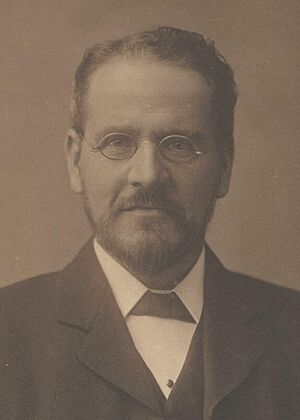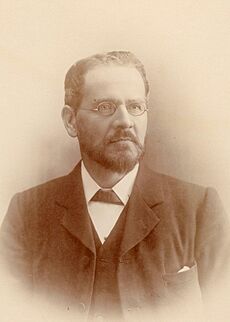Edward Pulsford facts for kids
Quick facts for kids
Edward Pulsford
|
|
|---|---|
 |
|
| Senator for New South Wales | |
| In office 29 March 1901 – 30 June 1910 |
|
| Personal details | |
| Born | 29 September 1844 Burslem, Staffordshire, England |
| Died | 29 September 1919 (aged 75) Chatswood, New South Wales |
| Nationality | English Australian |
| Political party | Free Trade (1901–06) Anti-Socialist (1906–09) Liberal (1909–10) |
| Spouses | 1) Mary Charlotte Stainforth (1870–death) 2) Blanche Elspeth Brown (1919) |
| Occupation | Journalist |
Edward Pulsford (born September 29, 1844 – died September 29, 1919) was an important Australian politician. He was born in England but moved to Australia. He is best known for strongly supporting "free trade." This means he believed in letting goods move between countries without high taxes or rules.
Pulsford started a successful business with his father. Then, in 1883, he moved to New South Wales, Australia. There, he became a very active supporter of free trade. He even helped start a group called the Free Trade and Liberal Association. This group later became the main force behind the Free Trade Party. He tried to get into the New South Wales parliament but didn't win at first. However, he was chosen to be part of the New South Wales Legislative Council in 1895. He served there until 1901. Then, he was elected to the Australian Senate.
Edward Pulsford was always against any form of "protectionism." This is the opposite of free trade, where countries put taxes on imported goods to protect their own industries. He also strongly opposed the White Australia policy. This policy aimed to limit non-European immigration to Australia. He spoke out against it in newspapers and in parliament. He was one of the few politicians who voted against the Immigration Restriction Act 1901. This law made it very hard for non-white people to move to Australia.
Contents
Who Was Edward Pulsford?
Edward Pulsford was born in Burslem, England, on September 29, 1844. His mother was Mary Ann, and his father, James Eustace Pulsford, was a minister and businessman. Edward went to a private school. He then worked with his father as a "commission agent." This means they helped buy and sell things for others. They worked together in Hull, England, from 1870 to 1884.
In 1870, Edward married Mary Charlotte Stainforth. She passed away before him. In 1883, Edward moved to New South Wales, Australia. His father moved to New York. After arriving in Sydney, Edward quickly became involved in the idea of free trade. In 1885, he helped create the Free Trade and Liberal Association of New South Wales. This group was a very early version of the Free Trade Party. Because of his strong support for free trade, he became an honorary member of the Cobden Club. This was a famous group in England that also supported free trade.
Pulsford's Early Political Work
From when it started until 1891, Pulsford was the secretary of the Free Trade and Liberal Association. He was very busy organizing events and writing many pamphlets. These were small booklets that explained his ideas. He even won a prize for an essay he wrote in 1887. It was about how free trade would help the colony of New South Wales.
He also worked as a journalist. He owned the Armidale Chronicle newspaper. He was also the financial editor for Daily Telegraph from 1890 to 1898. While he mostly focused on free trade, he also helped put together an Australian biography book. He also supported the idea of Federation. This was when the different Australian colonies joined together to form one country.
Pulsford was a strong supporter of free trade. He tried to become a member of the New South Wales Legislative Assembly in 1891 but did not win. However, in 1895, he was chosen to join the New South Wales Legislative Council. This was thanks to George Reid, who was the Premier (leader) of New South Wales and also supported free trade.
In parliament, Pulsford continued to support free trade. But he was different from many of his colleagues. He strongly opposed rules that limited immigration from Asian countries. He had written about his sadness for the Australian Aborigines in 1888. He also spoke out against a special tax on Chinese immigrants. He continued to oppose new laws in 1896 and 1898 that restricted immigration. Even though he is remembered for opposing the White Australia Policy, he did say "Of course, I believe in a white Australia" during a federal election campaign. This shows how complex politics could be at the time.
Pulsford in Federal Politics
In March 1901, Australia had its very first federal election. Edward Pulsford was elected as a senator for New South Wales. He was the sixth and final person chosen for the role. He continued to strongly support free trade. He was also one of the few senators who spoke out against the White Australia policy. He said that "the whole of the inhabitants of Asia" were his friends.
He opposed the Immigration Restriction Act 1901. This law made it very difficult for non-Europeans to enter Australia. He also believed that Asian people should be able to receive old-age pensions. He spoke out against the poor treatment of Kanaka labourers. These were Pacific Islanders who were brought to Australia to work. Pulsford said they were treated like "cattle." He pointed out that the immigration restrictions were insulting to countries like Japan. In 1905, he even published a pamphlet supporting the Japanese government's protests against the policy.
Pulsford spoke for five hours during a debate about a customs tax bill in 1902. Later, he supported setting time limits for speeches. He was not given a leadership role when the Free Traders were in power from 1904 to 1905. He was also absent from parliament for most of 1907. A newspaper called him "the best living authority on Australia's tariff question." He also wrote a pamphlet for the Cobden Club in 1907, which was well-received.
He was against women's suffrage, which is the right for women to vote. He believed it would make Australia "in advance of public opinion throughout the world." He thought it would lead to the "vulgarisation of women."
In 1909, the Free Trade and Protectionist parties joined together. They formed the Liberal Party. This was a difficult time for Pulsford. He did not believe in either the old or new ideas of protectionism. Even though he joined the new party, he said his support for any protectionist laws would be only to show that such laws would fail. He lost his Senate seat in the 1910 Australian federal election. This was when the Labour Party won all the Senate seats in New South Wales.
Pulsford's Later Years
After leaving parliament, Pulsford continued to support free trade. In May 1914, he planned to start a free-trade newspaper. It would be sent around Australia, New Zealand, and South Africa. However, this plan was stopped when World War I began.
In 1917, he updated his book called Commerce and the Empire. It was first published in 1903. In the updated version, he argued that free trade was very important for the freedoms that the Empire was fighting for. He also called for free trade with Germany after the war ended.
On March 2, 1919, he married Blanche Elspeth Brown. They married in Neutral Bay. However, he passed away later that year on his seventy-fifth birthday, September 29, 1919. He was survived by his second wife and the three sons from his first marriage. Pulsford was buried at Gore Hill cemetery after an Anglican church service.
Images for kids
 | Selma Burke |
 | Pauline Powell Burns |
 | Frederick J. Brown |
 | Robert Blackburn |




